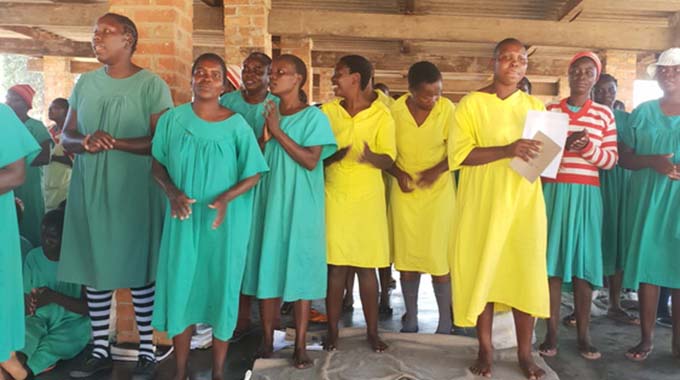By Samantha Chipoyera
When couples exchange vows, there is the usual traditional promise “till death do us part” bit which underpins a pledge of commitment.

The vow signifies that the married couple intends to spend the remainder of their lives together and only death will separate them.
But, there are times when the proclamations are put to test as life events unfold.
Among the many realities that shake marriages, a prison sentence ranks high in Zimbabwe, especially when the woman is the one convicted.
When most women are sent to jail, their marriages usually fall apart. The situation is different for men as wives usually stand by them through thick and thin.
One inmate Grace Kuvaoga (33) from Domboshava who is serving a five- month prison sentence at Chikurubi Female Prison says she is hurt and an emotional wreck.
Since she was convicted for assault and incarcerated, her husband has not visited.
“It is a painful experience. I came to prison three months ago together with my two-year-old baby. Ever since I stepped my foot in this prison, my husband and his relatives never came to check up on us. There is nothing I can do about it.
I wish I could get a chance to see him just once and ask if I had wronged him in any way,” Kuvaoga said.
Other relatives still show concern but she wonders why her husband has gone AWOL.
“My uncle is the only one that visits me and my baby. He also told me that my husband has started seeing another woman from our neighbourhood. I am not sure whether my husband still loves me or not.
“The thought of him leaving me for another woman haunts me every night. I still love my husband and I hope he will forgive me.”
Kuvaoga lamented the fact that incarceration in Zimbabwe is treated with so much stigma, that those left behind when their loved one is sent to prison usually don’t want to be associated with that stigma.
Angela Dzvova (not her real name) told The Herald, that her conviction came as a shock to her and her family.
“I was given four months for theft. When I committed this crime I never thought that I would be arrested. I am a businesswoman and someone took my goods on credit.
The person then failed to give me my money on the dates we had agreed. I ended up confiscating some wares from her house. That is how I got arrested,” she said.
During the trial, all seemed well. Her husband provided support and she thought it would continue even through her sentence.
“My husband stood with me during my trial and during that time I was pregnant with my daughter. Judgment came a few weeks after I gave birth and I came here to serve my sentence,” Dzvova said.
She added: “It is almost three months now and my husband only came once. I could sense when he came that he no longer felt the same like he used to do before.”
The irony of her situation is when her husband was in prison, she would visit almost daily, now that the tide has turned she has been left in the cold.
“When he was sent to prison I used to visit him regularly until he was released. My love for him never changed.
“I accepted him as the father of my children but he cannot do the same for me simply because I am a woman,” Dzvova said.
The Officer Commanding Harare Metropolitan Province Senior Assistant Commissioner Norbert Chomurenga told The Herald that most female inmates suffer rejection from their spouses as compared to their male counterparts.
“We did a survey and we noticed that most female inmates suffer when they are incarcerated as compared to male inmates.
“Their spouses just leave them here to suffer alone. Some of these women bring their children here and they have no one to support them,” he said.
“When you go to male prisons wives visit their husbands more often and other relatives do so as well.
“I would like to urge men out there who have their wives in prison to come and support and stand with them during hard times,” said Snr Assistant Commissioner Chomurenga.
According to a marriage expert, Sheri Stritof, the divorce rate among couples where one spouse is incarcerated for one year or more is 80 percent for men and close to 100 percent for women.
In Zimbabwe most female inmates suffer rejection from their spouses and their spouse’s relatives.
This will eventually lead to divorce.
It appears when a woman commits a crime and is incarcerated, she is viewed in the eyes of many as a deviant who is not worthy of being loved unlike heir male counterparts who would be easily forgiven by the society when they commit a crime. The Herald.






